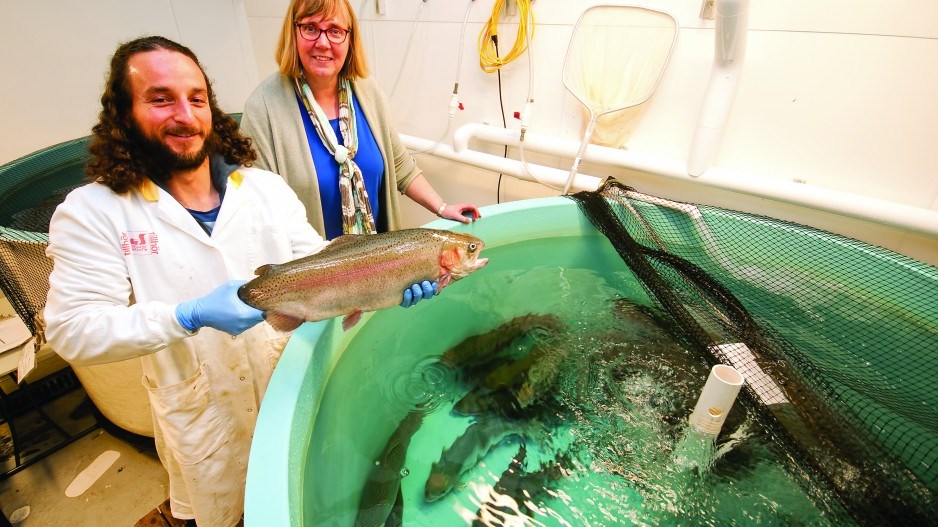Scientists at the University of British Columbia (UBC) will be using genetic research to give natural selection a push in raising fish and growing forests that are more resistant to the ravages of climate change.
Two UBC-based science projects, one for forestry and one for fish, are receiving more than $10 million in funding from the non-profit research organization Genome BC.
Both projects will use genomics – the mapping of the complete DNA sequences of organisms – to identify species that have already become more resistant to the effects of climate change through natural selection, and then give them a push through accelerated breeding.
“We are talking about taking advantage of natural variation that’s already present here in British Columbia,” said UBC zoology Prof. Patricia Schulte, who is heading up a 10-person research team that is trying to head off the kind of damage to fish that B.C. has already witnessed in its forests through the mountain pine beetle epidemic.
While the toll that climate change has taken on B.C. forests is now well known, only in recent years have fishermen and scientists begun to notice that rainbow and steelhead trout in B.C. are also starting to suffer from global warming.
Recreational fishing is estimated to be worth close to $1 billion in B.C. and $8 billion countrywide.
The problem for trout in B.C. is twofold. In rivers and streams, higher temperatures can weaken fish so much that they will not survive being caught and released by sport fishermen. Over the last couple of years, unusually hot summers have forced the closure of some popular rivers and streams to recreational fishing.
In lakes, the problem is less about temperature and more about variations in rainfall and rising alkalinity levels, which can affect a fish’s gills. Societies that stock B.C. inland waters have begun to notice that hatchery fish are not surviving in some lakes.
“Some of these lakes are getting up to around the pH of baking soda,” Schulte said. “It’s really quite high.
“We know that there are at least 160 lakes were pH is getting high, and about 60 of them are reaching a pH where there is a substantial concern for stocking. In a subset of these lakes the pH is high enough where stocked fish – if they were put in the lakes under those conditions – would not survive.”
Genome BC is providing $4.4 million for a four-year study in which a 10-person team of researchers will use genomics to identify trout that natural selection has already predisposed to be hardier, so that those fish can be bred by hatcheries to produce hardier stocks.
A similar approach is being used by UBC’s forest and conservation sciences department, but for B.C. woodlands.
UBC Prof. Sally Aitken is leading a $5.8 million research project that will use genomics to identify natural hardiness in some of B.C.’s more “economically important” tree species – Douglas fir, western larch, and lodgepole and jack pine.
The mountain pine beetle isn’t the only natural threat to B.C. forests. A disease called Swiss needle cast, which is caused by a fungus, is already affecting Douglas fir trees in Oregon and Washington, and it may be only a matter of time before it starts infecting B.C. Douglas fir.
The answer may not be breeding hardier trees; instead, researchers are looking at the possibility of changing tree species’ range through “assisted migration.”
Selective breeding has been used for decades. Seedlings are typically replanted in regions where the seeds came from. But because trees take decades to grow to maturity, it means today’s mature trees are producing seeds that are encoded for a climate that has changed dramatically.
“Those local trees are adapted to last century’s climate, so where should we be moving those trees to?” Aitken asked. “The other part of this is to give the tree breeders tools to select trees that may be more climate resilient or disease resistant.”
Aitken’s team will take seeds from various regions and look for variations in the genes to determine which trees stand a better chance of surviving by replanting farther north or farther up mountainsides than the trees might normally grow.
It is estimated that measures such as assisted migration could result in a 30% increase in timber yields. But is artificially accelerating nature’s pace a good idea?
Aitken concedes that assisted migration can be controversial.
“Moving species, expanding species’ ranges, is more controversial than just changing populations, because any time you bring a new species into an ecosystem, you are changing that ecosystem,” she said. “Long-distance movements of plants and of animals have caused a lot of ecological damage over history.
“Here we’re talking about pretty short moves. We’re talking about moving these species into areas that they would migrate to eventually, but it just takes them a long time.”




